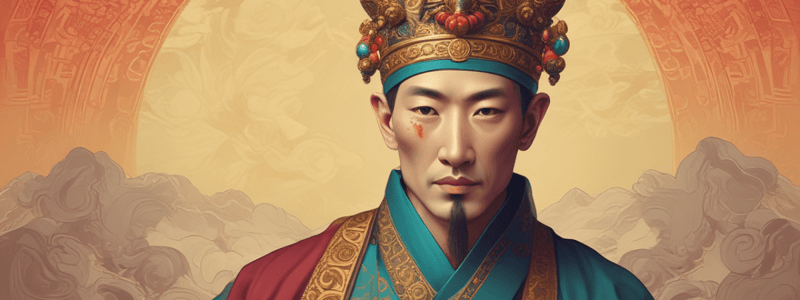Podcast
Questions and Answers
What happened to the Qin Dynasty after Huangdi's death?
What happened to the Qin Dynasty after Huangdi's death?
- It was replaced by the Han Dynasty (correct)
- It was divided into smaller provinces
- It remained the same with no changes
- It became more powerful and successful
Why are the records of Qin Shi Huang's life incomplete?
Why are the records of Qin Shi Huang's life incomplete?
- Because he was very secretive
- Because the records were lost over time
- Because many historians were Confucian (correct)
- Because he did not keep records
What did Qin Shi Huang establish to have a positive effect on China?
What did Qin Shi Huang establish to have a positive effect on China?
- A new system of government
- A series of roads, taxes, currency, weights, and measurements (correct)
- A new capital city
- A strong army
What was discovered in 1974?
What was discovered in 1974?
What was the reaction of the Chu and Han provinces to the Qin Dynasty?
What was the reaction of the Chu and Han provinces to the Qin Dynasty?
What is a characteristic of the terracotta army?
What is a characteristic of the terracotta army?
Why did Qin Shi Huang's historians embellish events?
Why did Qin Shi Huang's historians embellish events?
What was Qin Shi Huang's attitude towards the Confucian school of thought?
What was Qin Shi Huang's attitude towards the Confucian school of thought?
What happened to the Confucian texts?
What happened to the Confucian texts?
What was Qin Shi Huang's role in Chinese history?
What was Qin Shi Huang's role in Chinese history?
Flashcards are hidden until you start studying
Study Notes
Biography of Shi Huangdi
- Born Zhao Zheng in 259 BCE to the king of the Qin province, he later became known as Shi Huangdi.
- Accusations of his illegitimacy as the son of merchant Lü Buwei emerged; however, Buwei played a pivotal role in his rise to power.
- Ascended to the Qin throne at thirteen in 246 BCE, declared of age in 238 BCE.
Historical Context
- The Zhou Dynasty's decline from the fifth century BCE led to fragmentation into individual states, including Chu, Han, Qi, Wei, Yan, Zhao, and Qin.
- This era was marked by constant warfare, known as the Warring States and the Spring and Autumn periods, fostering many cultural legends.
- The Qin were initially viewed as barbarous compared to other states; however, their military prowess would later change perceptions.
Philosophical Shifts
- Early Qin rulers adhered to Confucianism, but reformer Shang Yang proposed a shift towards authoritarianism, enhancing military strength.
- Shi Huangdi rejected Confucian values, prioritizing martial success and meritocracy over traditional familial wealth.
Achievements as Emperor
- Reformulated the Qin military structure, emphasizing discipline and incentives for soldiers.
- Successfully unified China by conquering warring states, establishing a blueprint for future dynasties.
- Initiated major infrastructure projects, including the Great Wall of China and the Great Canal for improved connectivity.
- Instituted a standardized system of weights, measures, and currency, crucial for national unity.
Legal Reforms and Society
- Introduced a strict legal framework with severe punishments; failure to report crimes led to harsh penalties, which ensured adherence to the law.
- Implemented total war strategies, differing from traditional warfare, with a focus on aggressive tactics and ambushes.
Downfall and Legacy
- Became increasingly preoccupied with immortality, believed to have died in 210 BCE while seeking an elixir of life.
- His reign established the foundation for centralized governance in China, influencing dynasties for centuries to come.
- Buried in a monumental mausoleum guarded by over 8,000 terracotta soldiers, reflecting his desire for power and immortality.
Studying That Suits You
Use AI to generate personalized quizzes and flashcards to suit your learning preferences.




